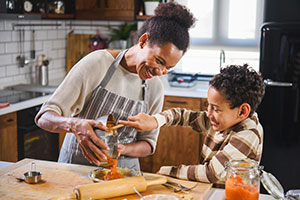News
Kid Chef: Cooking at Every Age
Date: 08/07/20
 Kids love helping in the kitchen and eating the food they get to make! Cooking with your children can be a fun and creative way to help them learn healthy eating habits. It's an excellent opportunity to talk to them about the importance of healthy foods, kitchen safety and cooking at home.
Kids love helping in the kitchen and eating the food they get to make! Cooking with your children can be a fun and creative way to help them learn healthy eating habits. It's an excellent opportunity to talk to them about the importance of healthy foods, kitchen safety and cooking at home.
Let them help
Plan for your kids to master each level before moving forward with more technical cooking activities. Here are some tips for helping them get familiar with the kitchen:
2-year-olds can:
- Wash fruits and vegetables. Use room temperature water or lukewarm water; do not use soaps or detergents.
- Wipe tabletops. Baby wipes are great for cleaning, or you may use a damp towel without any chemicals.
- Tear lettuce or greens. This task can help children with their tearing skills and make them feel like chefs!
- Break cauliflower or broccoli into pieces. Monitor that your child does not swallow a big piece that they could choke on.
3-year-olds can:
- Knead and shape dough. Sprinkle some flour on your child's hand and let them have some fun kneading and shaping. Children love the feeling of bread dough!
- Mix or pour ingredients. Young children need many chances to practice their pouring skills, and most likely, they will have a few spillovers along the way. Practice will make them perfect at it!
- Mix liquids in a covered container. Mixing ingredients can be an excellent way for young children to develop their fine motor skills.
- Apply soft spreads. Use a smooth edge kitchen tool or a spoon to spread.
- Put things in the trash or recycle bin. Use this opportunity to get young children used to throwing things out in the garbage can.
4-year-olds can:
- Peel oranges or hard-boiled eggs. Talk about the food as they are handling it. How are oranges grown and harvested? How does it smell, feel, look, or taste?
- Mash bananas or cooked beans. You may need to add some fluid (milk, water, or cooking water) to make it easier to mash. Use a fork or a potato masher.
- Set the table. Try to use dishes that are not breakable & avoid sharp items, such as knives.
5 to 6-year-olds can:
- Measure ingredients. Talk about how different quantities of ingredients can affect the nutrition and quality of a recipe. Incorporate math into cooking by using measuring cups, spoons or scales.
- Use an egg beater. Using an eggbeater may help develop a child's concentration and eye-hand coordination. Be patient with spills and mistakes.
7-year-olds and older can:
Help you with all of the above! At this age, children graduate from play cooking to serious cooking and are eager to pull an entire meal together. Guide them, give instructions, but don’t hover. Allow them to be creative and heap on the praise.
Have fun with young children in the kitchen, and take lots of pictures!
By Jennifer Herrera
This information is not intended as a substitute for professional medical care. Please always follow your healthcare provider’s instructions. Programs and services are subject to change. Managed Health Network, LLC (MHN) is a subsidiary of Health Net, LLC. The MHN companies include Managed Health Network and MHN Services, LLC. Health Net and Managed Health Network are registered service marks of Health Net, LLC or its affiliates. All rights reserved.
Sources: National Heart, Lung, and Blood Institute, USDA
.jpg)
